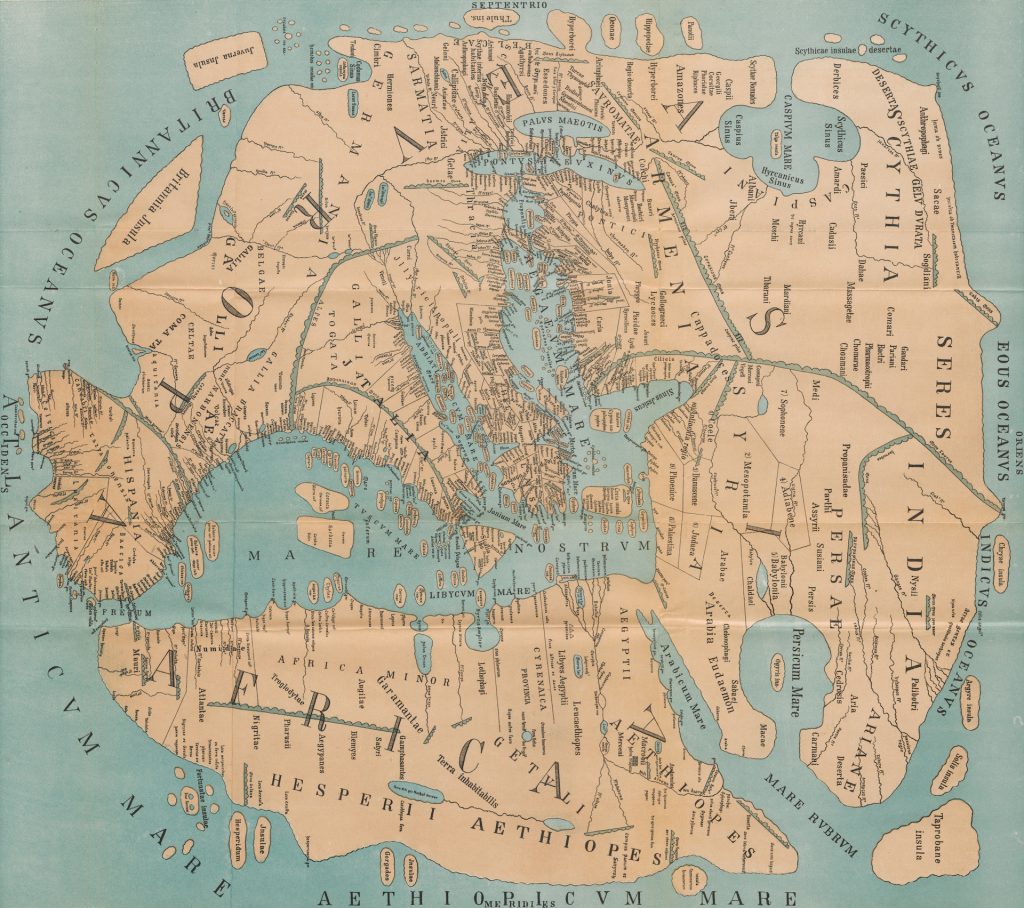
-Map of the world according to Pomponius Mela, as designed by Konrad Miller
“It was the thousand and one hundred and thirty-first year from the founding of the City . . .”
-Saturninius Salustianus, Neoplatonist scholar
“It was the six hundred and ninetieth year from the dawn of Iskandar . . .”
-Shapur Sakanshah, governor of Sistan
“It was the four hundred and thirty-seventh year of the Krita Samvat . . .”
-Ramagupta, exiled prince
“It was the three hundred and eighty-first year from the birth of our Lord . . .”
-Frumentius, bishop of Axum
. . . and the emperor was dead. Year after year, one after the other. The causes were many and, to all the greatest thinkers of the age, seemed unrelated. Four great lights, four conquerors who belonged to the four centers of the earth, snuffed as their flames reached their greatest heights. Civilization itself seems to have taken a step back, paused to lament its loss, or perhaps, having been blocked of its rise, descended again into the mire out of which it was pulled. The sun dimmed on those days, it is said, and the wind lost its swiftness. The tallest trees bowed and the beasts slumbered the entire day. What is to become of the world now?
In Rome, the Companion of the Sun has departed to rejoin his master. In his place is his son, adopted from the line of his cousin, the gentle Claudius Iulianus Procopius, to whom it seems the gods have turned against. His late father built the empire of Augustus and Traianus into a sphere of marble and steel and gold, the first land under the sun and the first to touch its light. Such an ascendance was paid for heavily, in seas of blood both Roman and barbarian. Now that the godlike presence of his predecessor is gone, those he has subjugated now consider Rome an open gate. Will the numerous tribes pay their tribute, no longer cowed by the might of legions? Will opportunistic generals and Caesars dutifully serve? Only the sun knows, and it is silent.
In Eranshahr, there sits upon the Takht-e Padishah a young Shapur III, thrown into the glamor of the Persian court where the hidden knife strikes deeply and in complete silence. His father spent his whole life staying assassins and those who buy them, with bribery, with force of arms, with the strength of his own will and the brutality of dubiously loyal servants of the state. The Seven Houses, each more unpredictable than the last, close in on the new king of kings, a boy just shy of growing into manhood. He may have his father’s blood, he may even have his father’s spirit and mind, but one man alone, even a great man, does not rule in the mountainous land of Hormazd. To be shahanshah is to give trust those who do not deserve it, and to pray often.
In the Gupta Raj, kin slays kin, and the call of power is irresistible. Lord Chandragupta II has made a name for himself on the field of battle, such that those sworn to him have taken to calling him by the name “Vikramaditya”, and it was true. With spear in hand and hatred in his heart, he truly does become for but a moment the sun, and he carries the army as a burning ray to scorch his enemies red and black. But the man held a lust for battle, perhaps insatiable, that can only end with his surrendering it for the peace of the gods or his dying in a pool of his own men. Whispers under the gaze of the maharajadhiraja persist, after having been rooted out and crushed many times, of his brother Ramagupta, the man who despised war too much, such that it drove his own brother to kill him. If he yet lives, the mere second son’s reign may prove tenuous after all, no matter how many victories he claims.
In Axum, an upheaval of conscience may just sweep the realm itself away. The kingdom has collected its loyalties under its previous kings, tribe by tribe and city by city. A hundred peoples, perhaps more, look to the mouth of the Red Sea for a ruler to guide them. Yet, who is to say if the ruler who does not have its own head could be held responsible for others. The new god is no friend to the old gods, and a way of life so ancient and entrenched is at once uprooted. Negusa Nagast Ouazebas loves his new god, but if the people do not share his zeal, he might not be able to call himself king for long. The tributaries export their treasure and their gifts, and import a strange new doctrine of total subservience and fear and awe before the one star that dots the sky. Such a strain pulls taut the fabric of society that could snap suddenly, and tear an empire from the pages of history.
One thing is for certain; the world is young again. Four boys stand where four men did once, and with each passing day the worth of gold becomes replaced by the worth of iron. A life of battle is to be the life of ignobility or a life of greatness, and that allure summons both slave and lord alike to abandon their lives on the farms in favor of a life in armor. There is wealth in this world, hidden in its harshest crags and its deepest marshes, buried under tombs centuries old and with long-dead kings. To claim it is only natural, for those who envision themselves heroes.
Leave a Reply